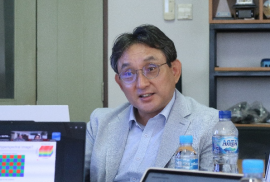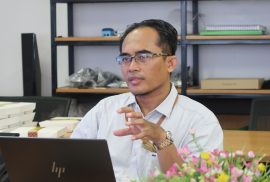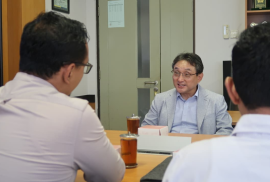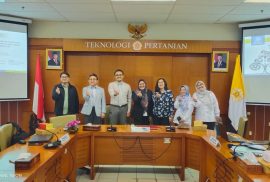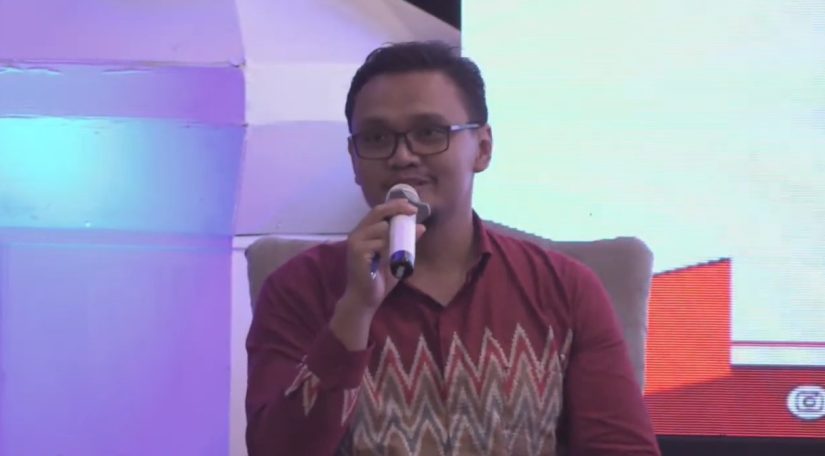
Yogyakarta, Sunday, July 20, 2025 — Dr. Arifin Dwi Saputro, S.T.P., M.Sc., a lecturer from the Department of Agricultural and Biosystems Engineering (DTPB), Faculty of Agricultural Technology, Universitas Gadjah Mada (FTP UGM), played an active role as moderator in the Policy Dialogue and Discussion Talk Show held in commemoration of the 78th National Cooperative Day. This prestigious event carried the theme “Inclusive and Innovative Cooperatives: Pillars of People’s Welfare and Sustainable Economy”, and was organized through collaboration between the Department of Cooperatives and SMEs of the Yogyakarta Special Region (DIY) Province, the Indonesian Cooperative Communication Forum (Forkopi), and the Directorate of Community Service at UGM.
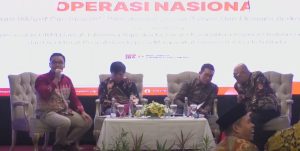
The event took place in the Ballroom of Grand Keisha Hotel Yogyakarta, attended by numerous prominent figures including Deputy Minister of Cooperatives and Coordinator of the Daily Executive Task Force for the Formation of Village/Subdistrict Cooperatives (Kopdes/Kel) Merah Putih, Ferry Juliantono; Governor of DIY Sri Sultan Hamengku Buwono X; Regional Secretary of DIY Aria Nugrahadi, S.T., M.Eng.; and UGM Vice-Rector for Student Affairs, Community Service, and Alumni, Dr. Arie Sudjito, S.Sos., M.Si.
The event began with a policy dialogue talk show moderated by Martha Sasongko, highlighting the importance of public policy in supporting the growth of cooperatives as people’s economic institutions. The discussion also portrayed how cooperatives can serve as drivers of inclusive and sustainable development.
Subsequently, a panel discussion and Q&A session was led by Dr. Arifin Dwi Saputro, focusing on three key topics relevant to the development of village-based cooperatives:
1. Business Strategies of Merah Putih Village Cooperatives: Driving Agricultural Downstreaming
Speaker: Prof. Dr. Jamhari, S.P., M.P. (Faculty of Agriculture, UGM)
This session explored how village cooperatives can become the engine of agricultural downstreaming through strengthening supply chains, utilizing post-harvest technologies, and creating added value for local products at the village level.
2. Pentahelix Synergy Including Existing Cooperatives: Key to Merah Putih’s Success for People’s Welfare
Speaker: Amirullah Setya Hardi, S.E., Cand.Oecon., Ph.D. (Faculty of Economics and Business, UGM)
This session emphasized the importance of collaboration among government, academia, business, communities, and media (pentahelix) to enhance cooperative institutional structures, increase competitiveness, and ensure the sustainability of village-based cooperative enterprises.
3. Building a Roadmap: Merah Putih Cooperative Success Strategies
Speaker: Cahyadi Joko Sukmono (Chairman of the National Executive Board of the Indonesian Self-Reliant Business Association – ABDSI)
The session highlighted the need for a clear roadmap in cooperative development, covering institutional strengthening, capacity building, digitalization, and business mentoring to enable village cooperatives to grow independently and competitively.
Dr. Arifin’s presence as a moderator reflects the commitment of DTPB FTP UGM academics in fostering productive dialogue spaces between academia and practitioners. Through this role, DTPB lecturers support the development of village cooperatives based on scientific approaches, sustainability, and the real needs of local communities.
This discussion is expected to build stronger synergy between academic institutions and stakeholders in supporting cooperative models that are inclusive, innovative, and adaptable to changing times. The insights gained from this forum also provide valuable input for applied research at DTPB FTP UGM, particularly in areas such as local resource management, precision agriculture, rural agro-industry, and the circular economy.
This initiative directly contributes to several Sustainable Development Goals (SDGs), including:
-
SDG 1 (No Poverty) through strengthening village economies,
-
SDG 2 (Zero Hunger) through downstreaming of agricultural products,
-
SDG 8 (Decent Work and Economic Growth),
-
SDG 10 (Reduced Inequalities), and
-
SDG 17 (Partnerships for the Goals) through cross-sector collaboration.
Through active participation in forums like this, the Department of Agricultural and Biosystems Engineering, FTP UGM continues to demonstrate its concrete contribution to knowledge-based development and sustainable empowerment of rural communities.

